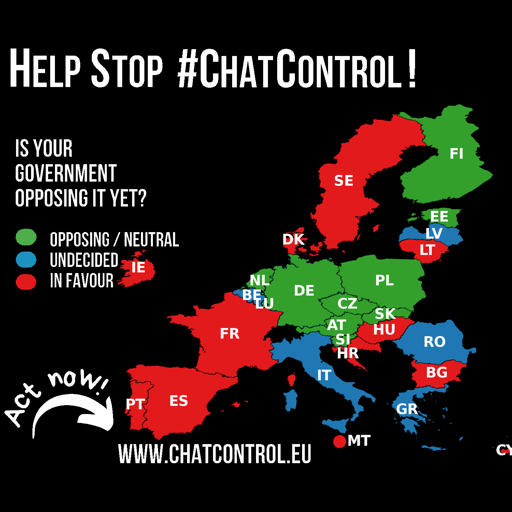- cross-posted to:
- technology@lemmy.world
- privacy@lemmy.world
- technology@lemmy.zip
- cross-posted to:
- technology@lemmy.world
- privacy@lemmy.world
- technology@lemmy.zip
…again. If it sounds familiar it’s not just you. But they’ve been back on “undecided” shortly after. Let’s hope this is the actual final decision.



We have to protest this shit every fucking year and those asshole politicians just keep trying.
We have to fight to get it denied every single time. They have to push it through only once. That’s why they keep trying.
…and we keep fighting.
The Czechs got upset at EU-level efforts on gun control — Czechia has permissive firearm law — and passed an amendment to Czechia’s constitution in 2021 guaranteeing certain firearm rights in Czechia. If the EU passed a directive that conflicted with it after that point without getting Czechs to approve an amendment to their constitution, Czechia would immediately begin violating the directive, which raises the stakes for people who wanted additional restrictions EU-wide.
One imagines that the same tactic could be used in other areas; if one or more EU members prohibited restrictions on end-to-end encryption or the like, it’d create a legal bar that would first need to be undone to create a restriction EU-wide.
That being said, if this sort of hardball tactic gets done too frequently, it’d make it really difficult to legislate at the EU level, because you’d have one state or another creating legal landmines all over.
And any other individual member could still impose their own state-level restrictions on end-to-end encryption in such a scenario — it’d only create an impediment to EU-wide restrictions.
AFAIK there are some EU countries with privacy laws that won’t allow chat control
I believe that the point of the Czechia situation was that it was a modification to the constitution; this will have a higher bar to change than would be the case for simply enacting an ordinary law. The idea was to entrench the status quo behind the bar for constitutional modification.
kagis
Looks like it’s a 60% supermajority in each legislative house:
https://en.wikipedia.org/wiki/Constitution_of_the_Czech_Republic#Amending_the_Constitution
So to produce such an effect, if there are laws that would prohibit bans on end-to-end encryption, say, those laws would need to be constitutional law or similar in an EU member state where such a law has a higher-than-ordinary bar to change.
Introducing: https://www.gesetze-im-internet.de/gg/art_10.html
Guarantees secret postal- and remote (original intent: radio) communications which applies to the internet ever since they thought they could make a quick buck by demanding radio broadcasting fees from youtubers, by which they placed the entire internet in the domain of radio laws.
Forget other EU countries and laws, the German constitution guarantees private postal and remote communications for every citizen. It’s also why Germany has historically never (that I know of) voted in favor of this bullshit: it violates the Briefgeheimnis (article 10 of the German constitution)
If they hadn’t rejected it the federal constitutional court in Karlsruhe would have sacked every single proposal on how to implement it, a process our current coalition is very familiar with from multiple attempts at trying to push preemptive collection of unencrypted data. They knew it wouldn’t pass here anyway and likely just waited on an opportune time to profit off the inevitable denial. Although I’ll give them that: some parts of the coalition were rather eager to meet the judges in Karlsruhe again anyway so it wasn’t a 100% guaranteed rejection either.
The EU is an economic-political union, not a socio-political union. Attempts to impose any sort of social law across all member nations feels like abuse of purpose, and also beside the point of having distinct member states in the first place.
As the IRA said to Thatcher, you have to get lucky every time, we only have to get lucky once
Classical Athens punished the people who proposed evil laws with fines or way worse. But our enlightened ”democracies” just let this happen without repercussions.
In Athens they also ostracized people the majority didn’t like from the polis, which is akin to what was once civil death.
Ancient Greece (and even less Rome, where I was born) are not at all my example of an enlightened society.
The question here is much simpler: Peter Hummelgård, Danish minister of justice and main author of the new proposal, is the man who got the Danish police a customized version of Palantir’s Gotham to “fight immigrant gangs”.
This is a man who recently said “we must break with the totally erroneous perception that it is everyone’s civil liberty to communicate on encrypted messaging services”, obviously lapping the peanut butter off Thiel’s genitals.
Lobbying needs to be better regulated, but especially people like him and everyone who voted for his party should see our fingers pointing to their faces in real life and online.
That’s how you fight this, by publicly shaming people for not grasping the fundamentals of Rights Culture.
I’m not saying the Ancient Greeks were nice, but I think politicians, especially career politicians, should face drastic consequences for betraying the constitution of the countries they’re supposed to serve. And classical Athens was only a minority of rulers among people who didn’t have any rights, but their institutions had some aspects that were more robust than modern States that have no checks and balances and rely on “but no one would ever do that”.
French police and municipalities have been using illegal surveillance (like Briefcam with the facial recognition enabled) for a long time and there are also no consequences, except for the fact the surveillance is being made increasingly legal because they “need” it.
It’s like Wheel of Time. The Dragon gets reborn again and again fighting “the last battle” forever.
I will proudly do so
For this kind of treasonous shit we really should have lifelong imprisonment back.
Nah, a ban from holding public office would do the trick easily enough.